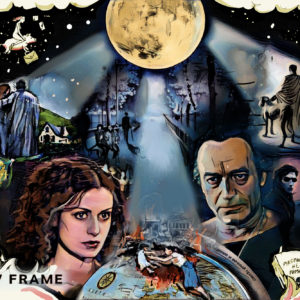A Friday of ‘bonds and burning’
Would that Good Friday were the catalyst for a coming together in Ukraine, as Father Yánaros implores in The Fratricides.
Author:
14 April 2022

That most sombre of days in the Christian calendar, Good Friday, falls on 15 April this year. Orthodox Christian Easter follows a week later, with worshippers in the Greek Orthodox, Eastern Orthodox and Russian Orthodox churches marking the day on 22 April. The nature of services in Orthodox churches in Ukraine – where they can take place at all, that is – is too painful even to contemplate.
Historically, whether in the Western or Eastern rites, Good Friday is the day congregations honour the sacrifice Jesus Christ made in giving up his life for his beliefs and ideas – radical and revolutionary ideas that put him in opposition to the secular Roman and religious pharisaical authorities of the day. Marking the day almost a century ago, the great poet and novelist Thomas Hardy wrote a characteristically robust and egalitarian contemplation of the meaning of Good Friday. Superficially, it could be read as an anti-religious, anti-God poem; actually, it is about the profoundest form of humanism tinged with belief, one of Hardy’s greatest masterpieces.
Unkept Good Fridays
There are many more Good Fridays
Than this, if we but knew
The names, and could relate them,
Of men whom rulers slew
For their goodwill, and date them
As runs the twelvemonth through.
These nameless Christs’ Good Fridays,
Whose virtues wrought their end,
Bore days of bonds and burning,
With no man to their friend,
Of mockeries, and spurning;
Yet they are all unpenned.
When they had their Good Fridays
Of bloody sweat and strain
Oblivion hides. We quote not
Their dying words of pain,
Their sepulchres we note not,
Unwitting where they have lain.
No annual Good Fridays
Gained they from cross and cord,
From being sawn asunder,
Disfigured and abhorred,
Smitten and trampled under:
Such dates no hands have scored.
Let be. Let lack Good Fridays
These Christs of unwrit names;
The world was not even worthy
To taunt their hopes and aims,
As little of earth, earthy,
As his mankind proclaims.
Good Friday, 1927
Related article:
It is almost impossible for the mind to grasp the horrors of Russia’s war on Ukraine, although to be fairer it is probably better described as Putin’s war. And next week, Ukrainians and Russians – brother and sister Slavs, Russian speakers both, and sharing the same religion – will go to worship and pray for their dead and for victory over the other. War makes fools of us all, those fortunate enough not to be tortured, raped and killed, that is. Spare a thought for God too, claimed by each side to be on their side.
In the pronouncements of the politicians and the commentariat (respectively the professional and armchair players in this bloody “game”) there is talk of the unipolar, the bipolar, the multipolar, extensions, contractions, concessions, neutrality, disarmament, denazification, materiel (armaments), the new Cold War, the old Cold War, the unending World War I now in its third phase, the ends of empires (at least two), the rise of a new empire, Great Power Politics, Great Man History, nuclear deterrence, etc. One looks in vain for a single mention of people. Forgotten or disdained by the contemporary Left, the old socialist motto “No people, no politics” languishes unused. Never was there a better time to make it more than words: as Victor Hugo noted in Les Miserables, “action is love” and “Love each other dearly always. There is scarcely anything else in the world but that: to love one another.” (Remember that Hugo was Marxian before even Marx.)
The Slavic slaughter in Ukraine calls to mind Nikos Kazantzakis’ little-known novel The Fratricides (not so celebrated as his magisterial Christ Recrucified and The Last Temptation or his lesser work, Zorba the Greek). Set in a time of civil war between the black and the red factions, The Fratricides has at its core and heart Father Yánaros, guiding the displaced people of his village to safety. Early on, Kazantzakis paints an unforgettable picture of the priest:
“Only one man stood among them, unarmed and disillusioned, his arms outstretched and empty: Father Yánaros, the village priest. He stood alone, looking to the left and to the right, not knowing which way to turn, constantly asking himself that same agonising question: ‘If Christ came to Earth today, whose side would He take? Would he go with the blacks? With the reds? Or would He, too, stand in the middle, with arms outstretched, shouting, ‘Brothers, unite! Brothers, unite!”

